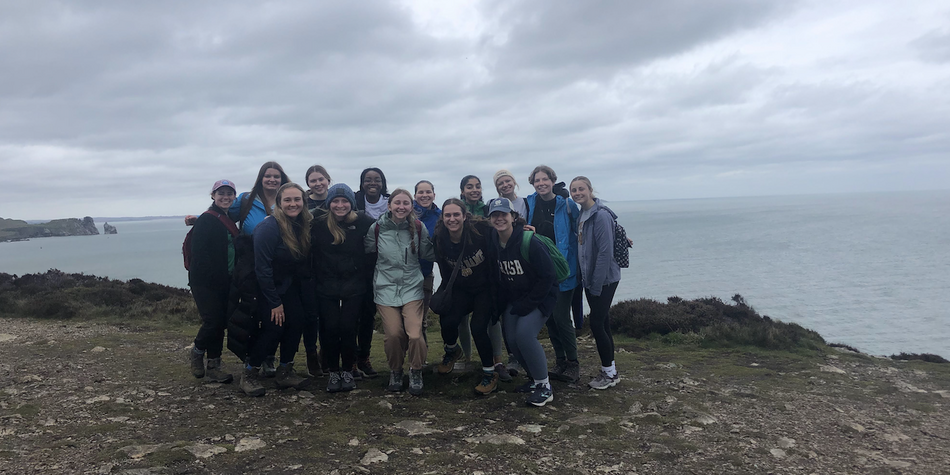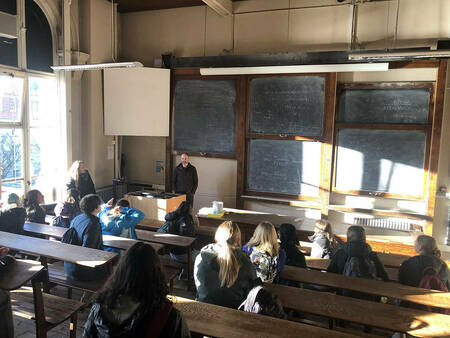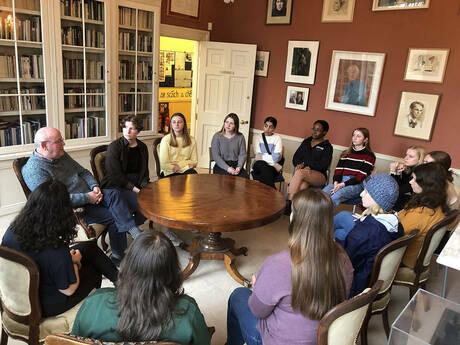Women in Engineering group experience Ireland’s sustainable engineering solutions

While others may have been catching a tan on the Florida keys, 12 undergraduate students in the Society of Women Engineers, led by Maria Warren, assistant teaching professor, Aerospace and Mechanical Engineering, headed to Ireland’s slightly more unpredictable climate over their spring break for a week of international, immersive experiential learning.
Site visits, lectures, panels, and presentations touched the breadth of engineering interests and actors across research and academia, private enterprise, government and semi-state organizations, from Dublin to Galway and the West of Ireland, hosted by both the Notre Dame Dublin Global Gateway and the Notre Dame Kylemore Abbey Global Centre.
With representatives from each undergraduate major, reflecting the breadth of what the College of Engineering has to offer, the uniting theme of the immersion trip was sustainability in engineering and design.
Reflecting on the trip to Ireland, Nicole Lies, a junior Chemical Engineering major, returned to Notre Dame in awe of the opportunities she and her peers will have upon graduation. Regardless of the industry, institution, or organization, Lies saw how impactful it can be to keep sustainability and the circular economy at the forefront of any project.
“Engineers can incorporate sustainability into anything we do,” she said confidently.
Madeline Prugh, a sophomore Electrical Engineering major, was particularly influenced by the group’s visit to the Dublin Port, where students met with both the Director of the Dublin Port Heritage initiatives and two Dublin Port Company project engineers. The port tour and presentations broadened her understanding of sustainability from simply an environmental concern to a more nuanced perspective including cultural preservation.
“We learned about the efforts to preserve the heritage of the port and the importance of strengthening relationships and trust between the community and the company,” she said. “The collaboration and the tensions between engineers, community, and tradition is an important aspect that must be understood with regard to any matter of sustainability.”
Meghan McClain, a 2019 graduate with a B.S. in Neuroscience, has since returned to the University to pursue a M.S. in Computer Science and Engineering. Between her undergraduate and postgraduate degrees, McClain worked as a data analyst at Wells Fargo while founding Twogul, a front-end web development organization assisting businesses and nonprofits in her local community to establish or modernize their web and app presence.
McClain was interested in the visit to Intel’s Leixlip Campus, home to a semiconductor wafer fabrication facility and the Movidius Engineering team, where students toured the production floor and learned about Intel’s AI and Machine Learning integration and application. McClain suggested to the presenter that Intel “build a recommendation system to optimize their chip-building process,” which prompted him to give McClain his business card and offer her an internship on the spot.
“It’s cool to see a multinational company like Intel appreciate suggestions from young engineers,” she said of the unique experience.
On a smaller scale (pun-intended), students visited late-stage startup Fresco, an integrated smart kitchen platform with a focus on reducing food waste. Fresco’s vice president of engineering, AI, Adam Bermingham, shared his experiences through the company’s transition from hardware to software and now platform, and its growth into the late-stage startup it is today, backed by the world’s top investors and trusted by the world’s leading appliance brands, like GE, Kenwood, Instant Brands, and LG.
Simran Moolchandaney, a computer science major with a minor in bioengineering, said hearing Fresco’s origin story taught her, “If you have an idea, take the risk to bring it to life. The worst possible outcome is failure. In that case, you try something different.” As a student-athlete on Notre Dame’s NCAA DI Fencing team, Moolchandaney treasured this rare opportunity to study abroad, connect, and engage with her peers who share a passion for approaching monumental issues fearlessly and engineering sustainable solutions to solve those problems.


Dr. John Gallagher, assistant professor in Civil, Structural, and Environmental Engineering at Trinity College Dublin, shared his work as an academic research engineer on national, European, and international projects on air pollution, nature based solution and green infrastructure, life cycle assessments and the circular economy.
Lillian Montabon, a environmental engineering major preparing to graduate this May, said before the Women in Engineering immersion, she “had not previously considered how achievable sustainability goals would look different in a small island country like Ireland.” Returning to the United States, she has “a lot of renewed hope for continuing to work in the environmental field.”
Alexa Zeese is in the five-year Dual Degree Engineering Programme pursuing a B.S. in Mathematics at St. Mary’s College and a B.S. in Electrical Engineering at Notre Dame. She said that while she had not previously considered a postgraduate degree after five years of undergrad, conversing with Trinity College Dublin’s Gallagher about electric vehicles and life cycle design and visits to state-of-the-art labs at University of Galway has since made her reconsider.
In the end, the week was as varied as the women who undertook it, from Dublin to rural Connemara, from wind farms to semiconductor factories, but the sentiment was the same: the students felt re-energized in their identity as women in engineering, forces for good in a world in crisis, possessing the education and the skills to do something about it.
“Over the week, we had numerous opportunities to discuss our shared experiences and reflect on the importance of diversity, equity, and inclusion in engineering,” Samantha Cook, a senior civil engineering major, said. “As we traveled throughout Ireland in our 12-woman cohort, I felt empowered as a woman in a male-dominated industry.”
Madeline Prugh said it best: “I have a renewed motivation to use my education as a force for the good of the global environment, a deeper understanding of the complexity of the role which engineers possess, and genuine connections with my fellow women in engineering.”
This story is a part of Notre Dame International and the Office of Sustainability’s Global Day of Action during #NDEarthWeek. In response to Laudato Si’s call to care for our common home with local action, the Global Day of Action is an invitation to Notre Dame students, staff, and alumni around the world, united by the same concern for our global ecosystem, to protect and conserve our common home.